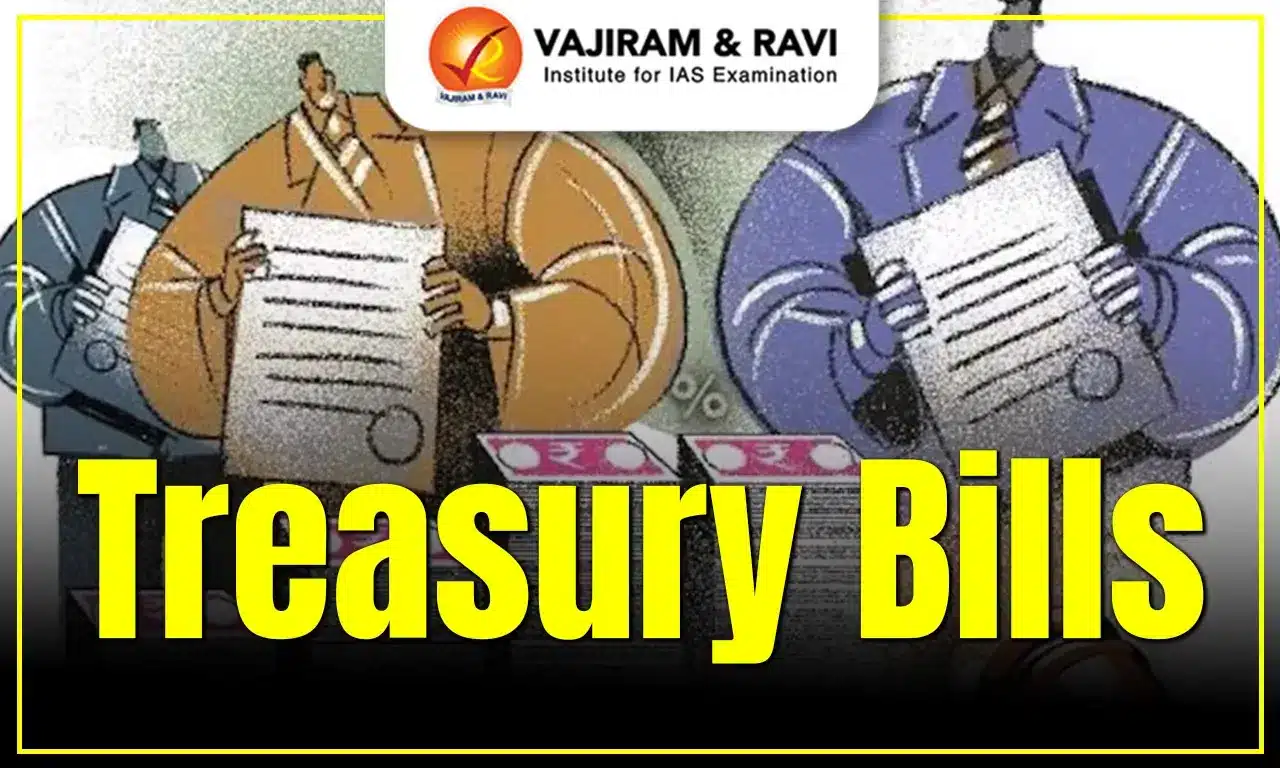Treasury Bills Latest News
India recently extended financial support to the Maldives by renewing a USD 50 million Treasury Bill for another year through the State Bank of India (SBI).
About Treasury Bills
- A T-Bill is a short-term debt instrument issued by the Indian government through the Reserve Bank of India (RBI).
- Purpose:
- The primary objective of a T-Bill is to meet the short-term financial requirements of the central government.
- RBI also issues such treasury bills under its open market operations (OMO) strategy to regulate its inflation level and spending/borrowing habits of individuals.
- For investors, they present one of the safest investments with the highest liquidity among government securities.
- Features:
- T-Bills are zero coupon securities, meaning they don’t pay interest.
- Instead, they are issued at a discount and redeemed at the face valueat maturity. For example, a 91 day Treasury bill of ₹100/- (face value) may be issued at say ₹ 98.
- The return to the investors is the difference between the maturity value or the face value and the issue price.
- Tenure: T-Bills are issued in India with tenures of 91 days, 182 days, 364 days.
- Minimum Investment: ₹25000 or multiples of this amount.
- Issue Process:
- T-bills are issued through an auction conducted by the RBI at regular intervals.
- The auctions are held at RBI’s electronic platform called E-Kuber.
- Who can buy T-Bills?
- T-bills can be purchased by any entity registered in India, such as banks, financial institutions, primary dealers, corporate bodies, institutions, mutual funds, state governments, trusts and even individuals in both primary as well as secondary markets.
Treasury Bills FAQs
Q1: What is the treasury bill?
Ans: A T-Bill is a short-term debt instrument issued by the Indian government through the RBI.
Q2: Is T Bill a good investment?
Ans: For investors, T-Bills present one of the safest investments with the highest liquidity among government securities.
Q3: What is the primary purpose of issuing Treasury Bills (T-Bills)?
Ans: To meet short-term financial requirements of the government.
Source: TOI
Last updated on June, 2025
→ UPSC Notification 2025 was released on 22nd January 2025.
→ UPSC Prelims Result 2025 is out now for the CSE held on 25 May 2025.
→ UPSC Prelims Question Paper 2025 and Unofficial Prelims Answer Key 2025 are available now.
→ UPSC Calendar 2026 is released on 15th May, 2025.
→ The UPSC Vacancy 2025 were released 1129, out of which 979 were for UPSC CSE and remaining 150 are for UPSC IFoS.
→ UPSC Mains 2025 will be conducted on 22nd August 2025.
→ UPSC Prelims 2026 will be conducted on 24th May, 2026 & UPSC Mains 2026 will be conducted on 21st August 2026.
→ The UPSC Selection Process is of 3 stages-Prelims, Mains and Interview.
→ UPSC Result 2024 is released with latest UPSC Marksheet 2024. Check Now!
→ UPSC Toppers List 2024 is released now. Shakti Dubey is UPSC AIR 1 2024 Topper.
→ Also check Best IAS Coaching in Delhi
Tags: Prelims Pointers treasury bills upsc prelims current affairs






















